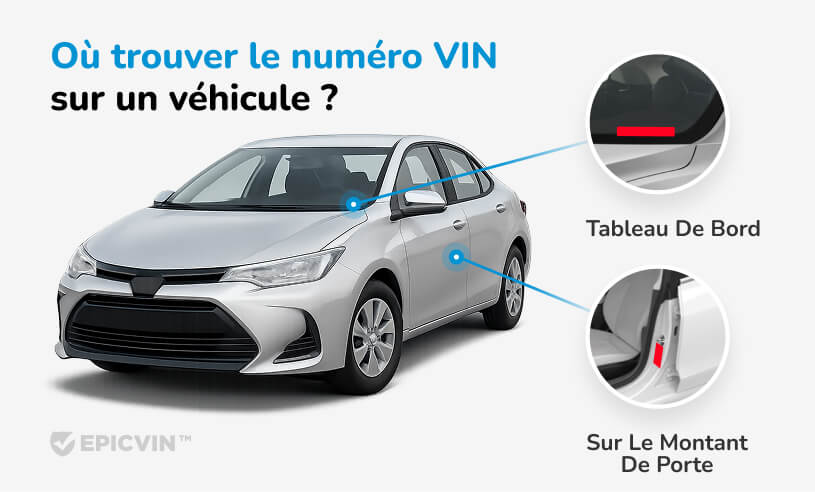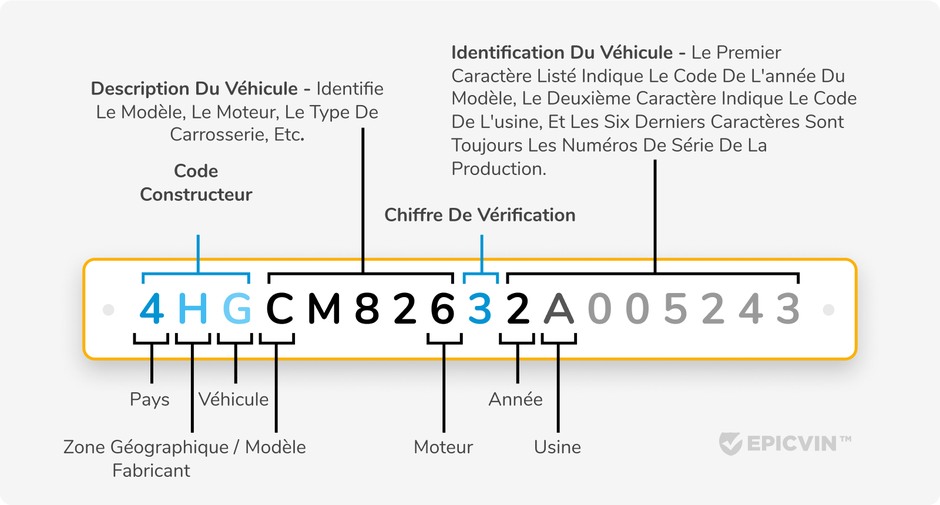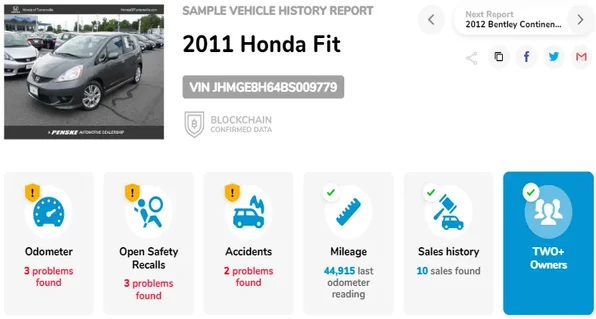
Décodage du numéro d'identification du véhicule (VIN)
Dans cet article, nous avons décrit en détail ce qu'est le code VIN.

Décodeur Suzuki gratuit ! 🚗 Consultez les spécifications, la fiche technique, les rappels et l'historique de base - sans inscription. 🛡️✅ Besoin d'informations sur les accidents, le kilométrage, le titre ? Passez à la version premium en un clic.
À la recherche du VIN ?
Voici où vous le trouverez :

Chaque véhicule Suzuki fabriqué depuis 1981 porte un numéro d'identification unique de 17 caractères. Il suit les normes de l'Institut ISO. Notre décodeur VIN révèle les spécifications essentielles, les informations de rappel et les données de sécurité. Protégez-vous des défauts cachés. N'oubliez pas que chaque entreprise utilise des codes spécifiques pour identifier ses voitures dans le monde entier.
Decoding your Suzuki VIN requires just four simple steps to access manufacturer specifications and safety information.

Recherchez le numéro d'identification du véhicule dans plusieurs emplacements standard sur les motos et véhicules Suzuki.
Voitures Suzuki :
Motos Suzuki :
| Risque Clé | Impact sur les Acheteurs | Étapes d'Atténuation |
|---|---|---|
| Risque de Vol | ~850 708 vehículos ont été volés aux États-Unis en 2024 — une baisse de 17 % par rapport à plus d'un million en 2023. | Utilisez les vérifications VIN NHTSA et NICB, installez des antivols de direction ou des immobilisateurs, et garez-vous dans des zones bien éclairées. |
| Rappels de Sécurité Non Réparés | Suzuki a eu 3 rappels affectant ~3 041 unités américaines début 2024. | Inscrivez-vous aux alertes de rappel NHTSA en utilisant votre VIN ; programmez un service chez les concessionnaires certifiés Suzuki. |
| Dépréciation au Fil du Temps | Aucune donnée spécifique à Suzuki, mais les véhicules légers se déprécient généralement de ~15-25 % la première année. (Standard de l'industrie) | Vérifiez les guides de dépréciation basés sur VIN et comparez les prix d'annonce sur les plateformes. |
| Fraude de Retour d'Odomètre | ~452 000 cas de fraude d'odomètre annuellement aux États-Unis ; fait reculer ~3,47 % des véhicules dans les 11 ans. | Examinez l'historique de kilométrage basé sur VIN, comparez l'odomètre avec les registres d'entretien, et inspectez l'usure. |
| Historique d'Inondation ou de Récupération Caché | Les indicateurs de titre NMVTIS/NHTSA détectent le marquage d'inondation, de récupération et d'incendie dans les rapports VIN. | Passez toujours le VIN par NMVTIS ; demandez photos et documentation du titre avant l'achat. |
Comment réduire les risques : Vérifiez les rapports VIN quotidiennement. Surveillez les notifications de rappel et vérifiez les traces de kilométrage papier et numériques pour éviter la fraude et les défauts cachés.
| Problème | Modèles Affectés, Symptômes, Coût Moyen de Réparation |
|---|---|
| Gonflement du maître-cylindre de frein avant | 2022-2024 GSX 1300R (kilométrage élevé). Levier mou et distance d'arrêt longue. ~200 $ pièces + main-d'œuvre. |
| Séparation de la bande de roulement du pneu arrière | 2023-2024 DL800DE. Fissuration et vibration du pneu. ~300 $ remplacement de pneu. |
| Défaut de chaîne d'entraînement | 2024 GSX 8R (faible kilométrage). Jeu et bruit de chaîne. ~250 $ chaîne + installation. |

Chaque caractère dans la séquence unique de votre véhicule raconte une histoire spécifique grâce à une combinaison de chiffres et de lettres.
Il y a quelques autres détails que les propriétaires et acheteurs Suzuki devraient connaître :
Les rappels Suzuki définissent occasionnellement des plages VIN dans les positions 12-17.
Voici un exemple de la façon dont notre décodeur VIN Suzuki interprète une séquence d'échantillon (utilisant VIN : JS2AC35S9P5100768) :
| Symboles | Échantillon | Ce qu'il Révèle |
|---|---|---|
| 1 | J | Japon comme pays d'origine |
| 2 | S | Suzuki comme fabricant |
| 3 | 2 | Type de véhicule moto |
| 4-8 | AC35S | Ligne de modèle, type de moteur, cylindrée et configuration de carrosserie |
| 9 | 9 | Chiffre de contrôle pour validation |
| 10 | P | Année modèle 2023 |
| 11 | 5 | Usine d'assemblage Hamamatsu, Japon |
| 12-17 | 100768 | Numéro de série individuel du véhicule |
Année 2020
Marque Suzuki
Modèle DR-Z400SM
Type de carburant Gasoline
Moteur 0.4L K419-
Fabriqué en USA
Notre décodeur VIN extrait des informations précieuses de chaque numéro d'identification de véhicule.
EpicVIN actualise les DMV pour que vous voyiez le statut de rappel et de titre le plus récent quotidiennement.— Alex Black, CMO, EpicVIN
Vérifiez les emplacements spécifiques. Ce sont la base du pare-brise, l'autocollant du cadre de porte, la plaque de châssis, ou les documents d'immatriculation.
Vérifiez les trois premiers caractères : les Suzuki construites en Malaisie commencent généralement par « MHR » ou des codes similaires spécifiques au pays.
Les 5e et 6e caractères indiquent généralement la taille du moteur, avec des lettres spécifiques représentant les plages de cylindrée.
Suzuki a quitté le marché automobile américain en 2012, se concentrant uniquement sur les motos et les produits marins.
Oui, la 10e position suit les codes d'année modèle standard, où « R » représente 2024 pour tous les fabricants.
Oui, les caractères 1-3 et les codes spécifiques au marché en positions 4-8 indiquent le marché de destination prévu.
Les rappels ciblent des lots de production exacts avec des défauts identiques, utilisant des numéros VIN séquentiels de dates de fabrication spécifiques.
Oui, la plupart des motos Suzuki ont des estampages VIN secondaires sur le col de cadre pour la vérification des forces de l'ordre.
Les Suzuki fabriquées en Thaïlande utilisent généralement « MLS » ou « ML1 » comme Identifiant Mondial du Fabricant en positions 1-3.
Oui, tous les véhicules Suzuki, y compris les modèles tout-terrain, doivent avoir le chiffre de contrôle mathématique en position 9.
Passez le VIN dans notre décodeur : des chiffres de contrôle invalides ou des caractères non reconnus indiquent des erreurs d'impression.
Découvrez des conseils d'experts, des astuces et des informations sur l'achat et l'entretien de véhicules d'occasion.

Dans cet article, nous avons décrit en détail ce qu'est le code VIN.

Dans ce billet, nous allons passer en revue les types de titres de marque les...

Dans notre article, vous apprendrez à lire correctement nos rapports d'histori...